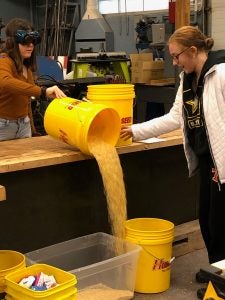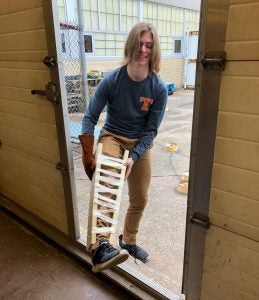These students experienced what it was like to have a disability in agriculture, like low-vision or degraded eyesight and mobility limitations
Long before the coronavirus pandemic set forth a complete change of course, students involved in Tyrone Area High School’s Agricultural Education program in Pennsylvania began the 2019-20 school year examining how agriculture impacts their everyday lives.
Fast-forward to today’s agricultural climate amid the global pandemic, where many of us have experienced first-hand a renewed appreciation of how agriculture impacts our everyday lives — from food production to shortages at supermarkets to issues of food access.
But as students from Tyrone started exploring the topic, they added another layer. They wanted to understand what it is like for a farmer with a disability or health condition to work in agriculture. The conversation began at a Tyrone FFA Chapter meeting last fall.
“I’ll be honest — I never thought a simple conversation between two members would turn into the beginning stages of a movement,” said Tiffany Hoy, Tyrone Area FFA advisor and agricultural educator.
The students — all of whom plan to work in agriculture someday — set out to develop a way for all of the students in the chapter to have a deeper understanding of what it is like to work on a farm with a disability or health condition. Creating some type of physical course so that students could experience things first-hand rose to the top.
Hoy suggested the students reach out to AgrAbility PA, a nonprofit project in Pennsylvania that assists farmers and agricultural workers with a disability or long-term health condition. The project provides resources and supports farmers who need to continue working in or return to production agriculture.
“It was amazing to hear from the Tyrone students — young people in agriculture interested in knowing more about the farming population AgrAbility PA serves — what a win-win. It was great talking with them about what we do and the services and support we can provide,” said Abbie Spackman, project assistant for AgrAbility PA.

Spackman connected the students with a farmer who has a goat and sheep farm not far from Tyrone. The farmer, diagnosed with multiple sclerosis (MS) a few years ago, has limited mobility and dexterity. In December 2019, students with the Tyrone Area FFA Chapter met with the farmer and his wife on their farm. The students spent the afternoon observing in-person how farm work and chores are completed by a farmer with functional limitations.
“We as youth should volunteer more to help our farmers. This experience made me realize that farmers don’t get a day off because of weather, if they are tired, or if they have a disability,” said student Libby Buck.
The challenge course
By January, the in-school AgrAbility Challenge Course was set. Students divided into small groups and each member was assigned a disability, which students researched as commonly found in agricultural operations across the United States, such as low-vision or degraded eyesight and mobility limitations.
The course started with each student immobilizing his or her thumb of a chosen hand and then sliding it into a welding glove. Next, the students had to tie their shoes and try their hand at opening large boxes and feed bags.
“I learned how difficult it is for farmers to complete daily tasks when they have a disability or injury. I know that personally I take things for granted and this challenge reminded me of this fact,” said student Trinity Lingafelt.
Then, the students had to feed goats and sheep while wearing eye coverings that impaired their vision. Goats need copper in their diet; whereas copper will poison sheep. Students had to measure out the correct amounts into the identified buckets and carry it across the shop to dump it over a counter into a feed bin for the animals to eat. Students learned that trace amounts of copper residue in a bucket could be harmful to sheep over time, so mixing feed or buckets was also an issue and problematic for students.
“I had to depend on someone telling me how much grain had to go in each bucket and which bucket the feed had to go in,” said student Nathan Cisneros.

The final part simulated what it would be like to have an injury or disease which caused limited or complete loss of a leg or hand, or both. Students had to carry buckets of water or feed, move through a doorway with a step, and herd “Bertha” the pretend cow around some posts.
“It was a lot harder than I thought to move the cow, especially since I did not have full mobility of my left leg or hand. I cannot imagine if I was trying to do this with a live animal,” said student Kaylee Updike.
“The AgrAbility Challenge Course left a big impact on the membership and made the students very aware of the physical struggles some of our farmers face,” said Hoy.
Following the challenge course experience, students met to develop and share ideas that might assist farmers in easing the impact of some of these limitations around the farm — such as livestock gates that open-and-close from a phone app; solar-powered sleeves to keep ice from forming in water buckets during winter; and a tie-off kit with a quick release latch-and-halter ring to assist with handling livestock.
By mid-March, the coronavirus pandemic impact was felt in Pennsylvania and its schools were closed.
“Even in this time of COVID-19, locking us out of our school, the students are still coming up with ways to advocate for the agriculture industry and thanking those who are providing for our needs, especially those with disabilities who persevere,” Hoy said.
Hoy said that students have remained in contact with one another, continuing to advocate for those working in agriculture. She says the students intend to continue learning and developing new experiences that will further the importance of agriculture in their daily lives.
“Advocacy is a new idea for many of our members, but they are empowered and want to take this role and be a moving force,” she said.
This article was written by Garin Hoy, chapter Vice President & committee officer liaison for Tyrone Area FFA. To learn more about how AgrAbility PA works with farmers and agriculture workers with a disability or long-term health condition, call 814-867-5288 or visit agrabilitypa.org.

